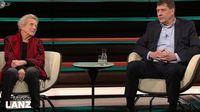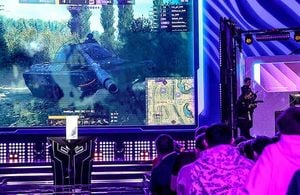In a compelling episode of 'Markus Lanz' aired on March 20, 2025, former RAF terrorist Silke Maier-Witt confronted Jörg Schleyer, the son of Hanns Martin Schleyer, who was kidnapped and murdered by the RAF back in 1977. The meeting made waves across Germany, where the echoes of that turbulent time, known as the German Autumn, still resonate deeply.
Hanns Martin Schleyer, a prominent business leader in Germany, was taken hostage by the Red Army Faction (RAF) on September 5, 1977. His four companions, including security personnel, were brutally killed during the ambush. The kidnapping sought to leverage political pressure for the release of imprisoned RAF members. However, when the government, led by Chancellor Helmut Schmidt, refused to comply, Schleyer's lifeless body was discovered on October 18, 1977.
During the episode, which was charged with an atmosphere of tension and unresolved emotions, Jörg Schleyer expressed his ongoing quest for answers, particularly surrounding his father's final hours. “I find it important to take someone’s hand when they come to me,” he said, exemplifying his struggle to understand those responsible for his father's death and the very tenets of their actions. Despite his desire for closure, Schleyer’s most crucial question—what transpired in the final moments of his father’s life—remained unanswered.
Maier-Witt, however, was evasive during the exchanges, stating, “The matter was settled. As a group, we had reached an end.” This response underscores the tension between the two participants, as Jörg sought clarity where Silke obscured it.
Markus Lanz, the host, pressed for deeper insights and motives behind such violent actions that affected countless lives. His inquiry, “Why is this risk taken? For what idea?” resonated throughout the discussion, offering little in terms of satisfaction but eliciting contemplation among viewers. Maier-Witt’s response, “The liberation of imprisoned RAF members,” seemed tragically ironic to those familiar with the history; the very people they aspired to save remained incarcerated even after the brutal tactics employed.
The conflict of ideologies surrounding the RAF was evident as Wolfgang Kraushaar, a political analyst and chronicler of the RAF’s history, weighed in during the show. He noted the complex ideological motivations of the terrorists while juxtaposing it against the dark legacy of the Schleyer family’s ties to the Nazi regime. Lanz provocatively stated, “Your grandfather was in the SA, your father in the SS,” questioning whether these historical legacies contributed to Schleyer’s targeting, although he emphasized that such connections could not justify the murder.
Adding to the tension, Klaus Pflieger, a former RAF prosecutor who had interrogated Maier-Witt on several occasions, sharply challenged her about inconsistencies in her accounts of the events. “I have often felt that you struggle to confront your actions,” he remarked. Maier-Witt defended her position, affirming her participation in the kidnapping yet withholding key details about who delivered the fatal shots. This withholding of information only served to enrich the atmosphere of discontent and confusion that permeated the relationship between Maier-Witt and Schleyer.
The emotional struggle faced by Jörg Schleyer was palpable to viewers. Kraushaar articulated the root of their meeting was born from the son’s desire to uncover the truths surrounding his father’s murder, which he described as a “Gordian knot” that could only be untied if Schleyer were to engage directly with Stefan Wisniewski, the person alleged to have pulled the trigger. However, Jörg firmly resisted this idea, stating, “I do not wish to sit at a table with someone who killed my father.”
This confrontation on 'Markus Lanz' personified not only the unresolved horrors of the past but highlighted the ongoing debate surrounding the actions of the RAF and the lasting scars it left on those involved. Maier-Witt’s new book detailing her experiences as a terrorist adds another dimension to this already complex narrative, showing how the shadows of the RAF repeatedly intersect with contemporary issues faced in society.
As Germany reflects on its tumultuous history with terrorism, conversations such as these become crucial. The exchange shared by Schleyer and Maier-Witt reveals a profound exploration of guilt, responsibility, and the capacity for understanding amidst a backdrop of violence and tragic loss. The conversation opens a needed dialogue on forgiveness and the complex nature of human behavior when one is caught in the crosshairs of ideology and morality, ensuring that the specter of the past will not be swiftly forgotten.








